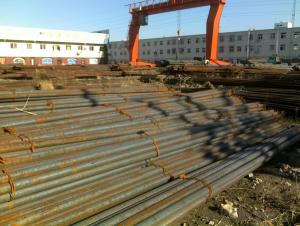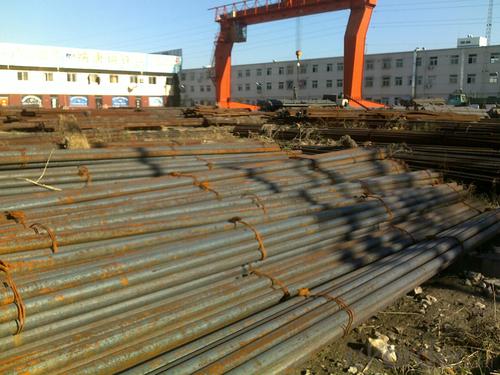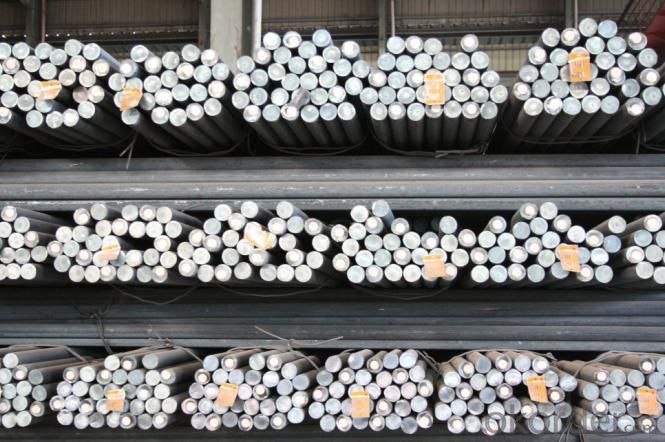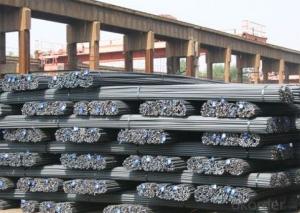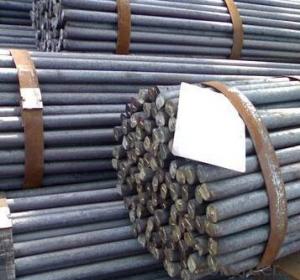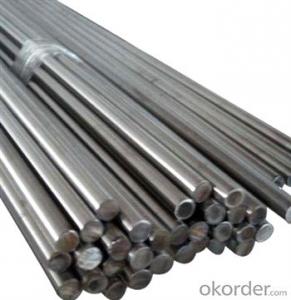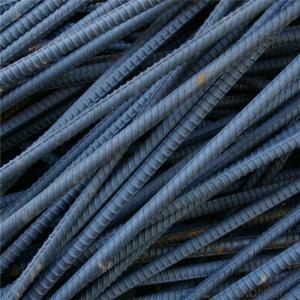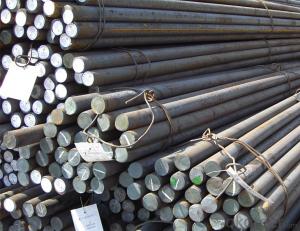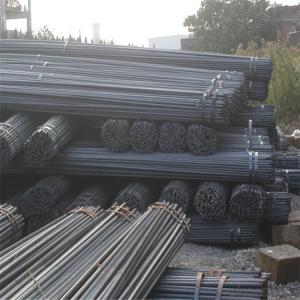Special Steel Reinforcing Steel Bars HRB400 Rebars
- Loading Port:
- China main port
- Payment Terms:
- TT OR LC
- Min Order Qty:
- 30 m.t.
- Supply Capability:
- 10000 m.t./month
OKorder Service Pledge
OKorder Financial Service
You Might Also Like
Specification
Product Information
1.Specification
Diameter(mm) | Φ6 ,Φ8,Φ10,Φ12,Φ13,Φ14,Φ16,Φ18,Φ20,Φ22,Φ25,Φ28,Φ32,Φ36,Φ40,Φ50 |
Length(m) | Unfolded / Straight Bundles weighing upto 2 Metric Tons and lengths is 6 Meters up to 15 Meters or according customers require |
U Shaped folded Bundles weighing up to 2 Metric Tons and lengths is 12 Meters | |
Rounded Coils ~ up to 2 Metric Ton Coils for Bending / Cutting Machine use. | |
Standard | GB(HRB335/HRB400/HRB500); |
BS4449 -1997 GRADE 250B, 460B; BS4449-2005 GRADE 500B; | |
ASTM A615 GRADE 40,GRADE60,GRADE75; ASTM A706; | |
DIN488-1 420S/500S, BST500S | |
JIS G3112 SD35, SD40, SD50,SD390 | |
NFA 35016 FE E 400, FE E 500 | |
CA 50/60 | |
GOST A3 R A500C | |
Surface finished | Screw-thread |
Epoxy coating | |
Galvanized coating | |
Production facility | Imports of production equipment from Italy |
Production capacity | 50,000 MT/month |
Payment term | T/T or 100% L/C at sight |
Package | In bundles. One bundles about 2-3tons |
2.Chemical composition
Grade | Technical data of the original chemical composition (%) | |||||
C | Mn | Si | S | P | V | |
HRB400 | ≤0.25 | ≤1.60 | ≤0.80 | ≤0.045 | ≤0.045 | 0.04-0.12 |
Physics capability | ||||||
Yield Strength (N/cm2) | Tensile Strength (N/cm2) | Elongation (%)
| ||||
≥400 | ≥570 | ≥14 | ||||
3.Theorectical weight
Diameter (MM) | Cross Sectional Area (MM2) | Theorectical Weight (KG/M) | Weight of 12M Bar (KG) | A Ton Contains 12M Bars (PCS) |
6 | 28.27 | 0.222 | 2.664 | 375.38 |
8 | 50.27 | 0.395 | 4.74 | 210.97 |
10 | 78.54 | 0.617 | 7.404 | 135.06 |
12 | 113.1 | 0.888 | 10.656 | 93.84 |
14 | 153.9 | 1.21 | 14.52 | 68.87 |
16 | 201.1 | 1.58 | 18.96 | 52.74 |
18 | 254.5 | 2 | 24 | 41.67 |
20 | 314.2 | 2.47 | 29.64 | 33.74 |
22 | 380.1 | 2.98 | 35.76 | 27.96 |
25 | 490.9 | 3.85 | 46.2 | 21.65 |
28 | 615.8 | 4.83 | 57.96 | 17.25 |
32 | 804.2 | 6.31 | 75.72 | 13.21 |
36 | 1018 | 7.99 | 98.88 | 10.43 |
40 | 1257 | 9.87 | 118.44 | 8.44 |
Product Show
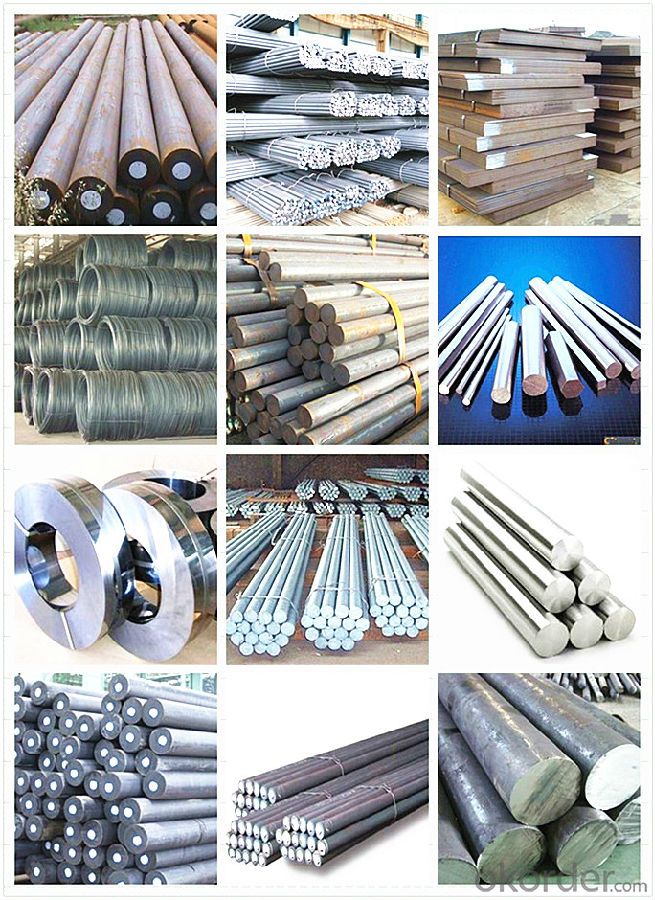
Workshop Show
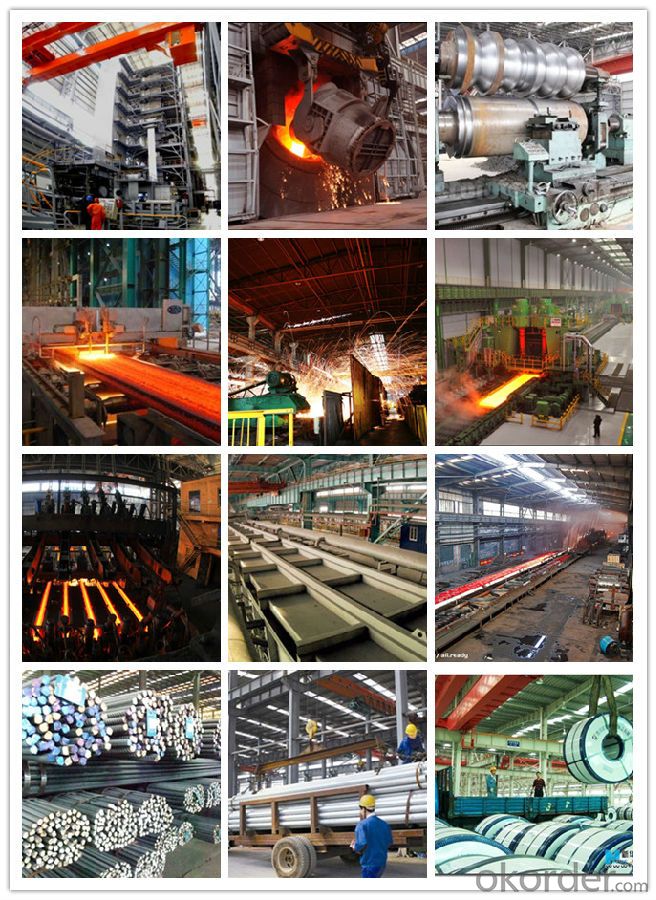
Shipping
1. FedEx/DHL/UPS/TNT for samples, Door-to-Door;
2. By Air or by Sea for batch goods, for FCL; Airport/ Port receiving;
3. Customers specifying freight forwarders or negotiable shipping methods!
Delivery Time: 3-7 days for samples; 5-25 days for batch goods.
Payment Terms
1.Payment: T/T, L/C, Western Union, MoneyGram,PayPal; 30% deposits; 70% balance before delivery.
2.MOQ: 1pcs
3.Warranty : 3 years
4.Package Informations: 1) EXPORT, In 20 feet (GW 25 ton) or 40 feet Container (GW 25 ton)
2)as customer's requirement
Why choose us?
(1) The leading exporter in China special steel industry.
(2) Large stocks for various sizes, fast delivery date.
(3) Good business relationship with China famous factories.
(4) More than 7 years steel exporting experience.
(5) Good after-sales service guarantee.
- Q: What is the life cycle of special steel products?
- The life cycle of special steel products typically involves several stages, including raw material extraction, steel production, manufacturing of specialized products, distribution and sales, usage by consumers, and finally, end-of-life disposal or recycling. This life cycle ensures that the special steel products go through various processes and stages before reaching the hands of the end-users.
- Q: How does special steel contribute to the overall economy?
- There are multiple ways in which special steel contributes to the overall economy. To begin with, special steel finds extensive application in industries such as automotive, construction, energy, and machinery, among others. Its distinct properties and characteristics make it the preferred choice for producing high-performance and durable goods. The demand for special steel not only creates employment opportunities in the steel industry and related sectors but also fuels economic growth. Moreover, the production and export of special steel play a vital role in a country's export earnings, thereby enhancing its trade balance and overall economic performance. Several countries, including China, Japan, and Germany, have greatly benefited from the export of special steel products due to their thriving steel industries. Furthermore, the development and advancement of special steel technologies have a positive impact on innovation and research and development (R&D). Companies in the steel industry invest in R&D to enhance the properties and performance of special steel. This not only results in the creation of new and improved steel alloys but also drives innovation in other industries that rely on special steel products. Additionally, special steel plays a crucial role in infrastructure development as it is extensively used in the construction of bridges, buildings, pipelines, and other critical infrastructure projects. By incorporating special steel, these projects gain durability, safety, and longevity, leading to long-term cost savings. Consequently, this contributes to economic development by promoting sustainable and efficient infrastructure. Lastly, special steel also contributes to the overall economy by fostering a competitive manufacturing sector. Countries with a strong special steel industry possess a competitive advantage across various sectors, as they can manufacture high-quality products more efficiently. This attracts investment, stimulates industrial growth, and enhances overall productivity, ultimately leading to national economic prosperity. In conclusion, special steel contributes to the overall economy through its wide-ranging utilization in diverse industries, its impact on export earnings, its influence on innovation and R&D, its contribution to infrastructure development, and its ability to foster a competitive manufacturing sector.
- Q: How does special steel perform in extreme heat conditions?
- Special steel is specifically designed to perform exceptionally well in extreme heat conditions. It exhibits high resistance to thermal fatigue, oxidation, and creep, making it suitable for applications that involve exposure to intense heat. The unique composition and processing techniques used in the production of special steel allow it to retain its mechanical properties and structural integrity even at elevated temperatures. One of the key characteristics of special steel is its high melting point, which prevents it from melting or deforming easily under extreme heat. This property is crucial in industries such as aerospace, power generation, and automotive, where components are subjected to intense heat and need to maintain their shape and functionality. Furthermore, special steel possesses excellent heat resistance, meaning it can withstand and dissipate heat effectively without losing its strength or becoming brittle. This property ensures that the steel remains durable and reliable even when exposed to prolonged high-temperature environments. Special steel also exhibits outstanding oxidation resistance, forming a protective layer on its surface that prevents it from corroding or degrading when exposed to oxygen at high temperatures. This resistance to oxidation allows special steel to maintain its performance and structural integrity over extended periods, making it highly suitable for applications in extreme heat conditions. In summary, special steel performs exceptionally well in extreme heat conditions due to its high melting point, heat resistance, and oxidation resistance. Its ability to withstand thermal fatigue, oxidation, and creep makes it a reliable and durable choice for applications that require superior performance in high-temperature environments.
- Q: How is shock-resistant alloy steel used in the production of impact-resistant parts?
- Shock-resistant alloy steel is used in the production of impact-resistant parts due to its high strength and ability to withstand sudden impact forces without fracturing or deforming. This steel is specifically designed to absorb and disperse energy, making it ideal for applications where parts are exposed to repeated impacts or high-stress environments. By using shock-resistant alloy steel, manufacturers can create durable and reliable impact-resistant parts that can withstand heavy loads, reduce the risk of failure, and increase the overall safety and longevity of the component or equipment.
- Q: What are the different forging methods used for special steel?
- There are several forging methods commonly used for special steel, including closed die forging, open die forging, and ring rolling. Closed die forging involves shaping the steel between two dies, resulting in precise and intricate shapes. Open die forging involves deforming the steel without any restriction from dies, making it suitable for larger and simpler components. Ring rolling is specifically used for producing seamless rings by rolling a heated metal between two dies. These forging methods help in enhancing the strength, durability, and quality of special steel products.
- Q: What are the advantages of using special steel in the renewable energy sector?
- Using special steel in the renewable energy sector offers several advantages. Firstly, special steel possesses exceptional strength and durability, making it ideal for withstanding extreme weather conditions and harsh environments often encountered in renewable energy projects. This ensures a longer lifespan and reduced maintenance requirements for renewable energy infrastructure such as wind turbines or solar panels. Additionally, special steel has excellent corrosion resistance properties, which is crucial in the renewable energy sector where exposure to moisture, saltwater, and other corrosive elements is common. This resistance helps prevent degradation and ensures the longevity of renewable energy components, reducing the need for frequent replacements and associated costs. Moreover, special steel can be tailored to specific designs and requirements, enabling the fabrication of complex and lightweight structures. This flexibility allows for the development of innovative and efficient renewable energy solutions, enhancing overall performance and energy production. Lastly, special steel is highly recyclable, contributing to the sustainability of the renewable energy sector. It can be easily recycled and reused, reducing the environmental impact and promoting a circular economy. Overall, the use of special steel in the renewable energy sector provides enhanced strength, corrosion resistance, design flexibility, and sustainability, making it an advantageous choice for renewable energy infrastructure.
- Q: How is special steel used in the production of conveyor belts?
- Special steel is used in the production of conveyor belts to enhance their durability, strength, and overall performance. Conveyor belts are commonly used in industries such as mining, manufacturing, food processing, and logistics to transport materials and goods. These belts are subjected to various demanding conditions, including heavy loads, high temperatures, and abrasive materials. Special steel alloys, such as stainless steel or heat-resistant steel, are used in specific parts of the conveyor belt to ensure its longevity and reliability. For example, stainless steel is often used in the wire mesh belts to prevent corrosion and rust, especially when the conveyor belt is exposed to moisture or chemicals. This helps to maintain the smooth and efficient movement of materials without contamination. Furthermore, special steel is employed in the manufacturing of belt fasteners, hinges, and other connecting components. These parts need to withstand significant tension, heat, and wear, and standard steel may not provide the necessary strength and durability. Special steel alloys can offer superior strength, resistance to high temperatures, and improved wear resistance, ensuring that the conveyor belt can function reliably even under demanding conditions. Moreover, in some applications where the conveyor belt is exposed to extreme temperatures, such as in steel mills or foundries, special heat-resistant steel is used. This steel can withstand the intense heat without deforming or losing its strength. It allows the conveyor belt to continue operating safely and efficiently in such extreme environments. In summary, special steel is essential in the production of conveyor belts as it enhances their durability, strength, and ability to withstand demanding conditions. Its use in wire mesh belts, fasteners, hinges, and heat-resistant components ensures the longevity and reliability of conveyor belts in various industries.
- Q: What are the main alloying elements used in special steel?
- The main alloying elements used in special steel include chromium, nickel, molybdenum, vanadium, and tungsten.
- Q: What are the different magnetic grades of special steel?
- The different magnetic grades of special steel include ferritic, martensitic, austenitic, and duplex stainless steels.
- Q: How does special steel perform in cryogenic conditions?
- Special steel performs well in cryogenic conditions. Its low temperature resistance allows it to maintain its strength, toughness, and ductility even at extremely cold temperatures. This makes it suitable for various applications in cryogenic industries, such as liquefied natural gas (LNG) storage tanks, aerospace components, and medical equipment. Additionally, special steel's resistance to brittleness and corrosion ensures its reliability and durability in these challenging environments.
Send your message to us
Special Steel Reinforcing Steel Bars HRB400 Rebars
- Loading Port:
- China main port
- Payment Terms:
- TT OR LC
- Min Order Qty:
- 30 m.t.
- Supply Capability:
- 10000 m.t./month
OKorder Service Pledge
OKorder Financial Service
Similar products
Hot products
Hot Searches
Related keywords
